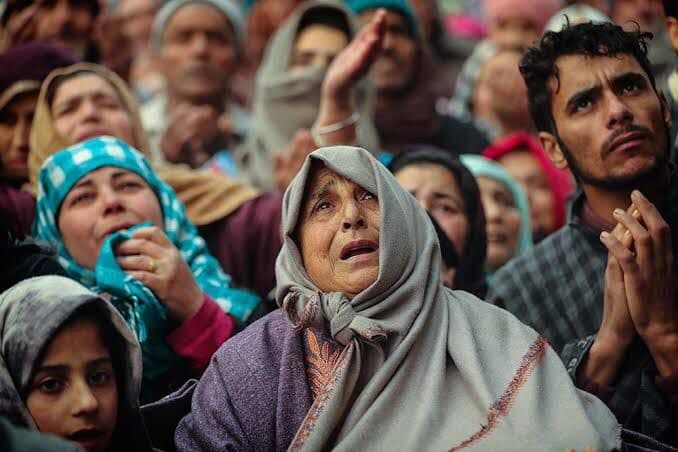Indian-occupied Jammu and Kashmir (J-K) is a diverse Himalayan region, famous for its natural beauty. It is also the oldest unresolved international conflict in the world today.
For almost half a century, J-K had its own constitution, its own flag, and could make its own laws. But two years ago, on 5 August 2019, the Indian Government imposed direct rule, revoking the state’s autonomy.
The Indian Government claimed its action this would raise the level of development in the region, but many fear this wais only the prelude to forced demographic change in India’s only Muslim-majority state.
So far, India has given around four million domicile certificates aimed at changing the demographic status. Meanwhile, there are accounts of deaths, disappearances, night raids, the abduction of boys, gangrapes, orphaned children, and little access to food and medicine, while more than 4,000 people have died from COVID-19.
The Kashmir Solidarity Council, Canberra will hold a peaceful rally in Civic on Saturday 7 August to highlight these human rights issues. They implore Australia to urge the Indian Government to restore Articles 370 and 35A of the Indian Constitution, which gave J-K its special status, and to hold a plebiscite Kashmiris have awaited for 75 years.
“This should not be seen as a territorial conflict; this is an indigenous movement and a human rights issue,” said Council member Iqbal Khan.
“Australians are peaceful people; they believe in human freedom, freedom of speech, and the right to determine our own destiny,” Mohammed Ali, another Council member, said. “It is about time that we came out and add our voice to help the Kashmiris, who have had a terrible life for more than 70 years.”
After Partition in 1947, both India and Pakistan claimed J-K, a former princely state and sovereign territory; the United Nations declared that a referendum should be held to determine whether Kashmir would join either country or become a separate nation.
According to the UNSC resolutions, “the final disposition of the state of Jammu and Kashmir will be made in accordance with the will of the people expressed through the democratic method of free and impartial plebiscite under the auspices of the UN”.
India’s founding prime minister, Jawaharlal Nehru, said Kashmiris should be given the right to self-determination.
That referendum has never been held.
India’s right-wing Hindu nationalist government, the Bharatiya Janata Party (BJP), vowed to end the state’s autonomy, and integrate it with the rest of India. In August 2019, Jammu and Kashmir was downgraded from a state to a union territory, the equivalent of a municipality, lacking its own government. The United Nations said this year that the loss of autonomy threatened minorities’ rights.
The valley was put on lockdown. J-K, already the most militarised zone in the world, was occupied by an estimated 900,000 Indian soldiers. Some 4,000 people were arrested, including political leaders, journalists, human rights defenders, and protesters. Security forces raided homes by night, and arrested young people. Protesters were beaten up or shot at. Internet, phone, and TV connections were blocked; and newspapers were closed or censored. The UN condemned the communications blackout and the human rights violations, and called on the Indian Government to restore basic freedoms.
Could this be the start of ethnic cleansing? A government investment site described the Muslim-majority state as “predominantly Hindu”. Before August 2019, residents of other Indian states could not buy land or property in J-K, but the Indian Government has given around four million domicile certificates to non-residents, allowing them to own property in the state. (Without the internet, many Kashmiris have been unable to obtain them.)
“This is a very conscious attempt to reduce the local population and bring in more people from other states of India to change the demography,” Mr Ali said.
If a plebiscite is held in a decade or two, Mr Khan worries, Kashmiris will have become a minority group; the Hindu majority will oppose separation.
“We appeal very strongly to the Australian Government to take an active role in preventing the atrocities there, and help them to give the right of self-determination so they have a better future, and can plan for their kids and their kids to come,” Mr Ali said.
In 2019, representatives from all major parties attended a symposium at Parliament House. Greens MPs at both Federal and local levels called to restore Kashmiri autonomy and respect their right to self-determination. ACT Labor and Canberra Liberal MLAs also agreed that Kashmir was an issue, and more needed to be done.
The rally will be held on the corner of London Circuit and Northbourne Avenue, on Saturday 7 August, from 1pm to 3pm. The Kashmir Solidarity Council invites all Canberrans to attend this peaceful rally and support Kashmiri human rights.
Physical distancing guidelines will be observed; masks and hand sanitiser will be provided.
For more information, call Iqbal Khan on 0403 069 578 or Javed Butt on 0402 141 771.
What, where, when?
Kashmir Solidarity Council Canberra
Peaceful rally to support Kashmiri human rights
Corner London Circuit and Northbourne Ave, Civic
Saturday 7 August 1-3pm
Enquiries: 0403 069 578
For more information on sponsored partnerships, click here.



